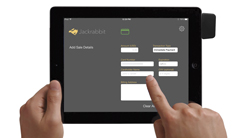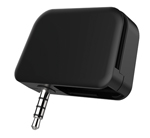By IvyLee Rosario
 Over the past year security has become a bigger issue than ever before. With data breaches becoming an increasing occurrence within businesses, retailers need to keep their data and credit card information safe. By October 2015 all merchants are supposed to be able to accept card chips in their businesses. Tom Sullivan, President of Jackrabbit, discusses what retailers need to keep in mind when upgrading their payment systems, changes that are happening in the industry and what the Jackrabbit does for merchants.
Over the past year security has become a bigger issue than ever before. With data breaches becoming an increasing occurrence within businesses, retailers need to keep their data and credit card information safe. By October 2015 all merchants are supposed to be able to accept card chips in their businesses. Tom Sullivan, President of Jackrabbit, discusses what retailers need to keep in mind when upgrading their payment systems, changes that are happening in the industry and what the Jackrabbit does for merchants.
There is a tremendous amount of fraud and theft in the payment industry, hence security is the biggest focus for business. Sullivan says that the payment space has become ridiculously competitive, and unfortunately it has become an industry that is not trusted. “Most business owners do not trust sales people in this age, and there is good reason for it. The industry has been focused on price wars since the late 90’s, and a new company called Square® reframed the entire sales process, making it a product war, which is great because now the customers are looking for a solution instead of a price.”
 Part of the problem with any sort of payment selection solution or a credit card machine is that it has a shelf life. “It eventually becomes antiquated, the programs become too large, there is not enough memory, and the terminals become outdated. That is a problem because then the merchant has to replace their credit card equipment every two to four years,” said Sullivan. Europay, Mastercard, and Visa (EMV) is another example where merchants are going to have to replace their equipment, because the magnetic swipe readers obviously cannot read computer chips.” Jackrabbit is a mobile payment solution that is easily compatible with a smart phone or tablet. The easiest part about using the Jackrabbit is that it is a simple application, meaning you can just update it without having to replace the entire piece of hardware as you would with EMV or a typical credit card machine.
Part of the problem with any sort of payment selection solution or a credit card machine is that it has a shelf life. “It eventually becomes antiquated, the programs become too large, there is not enough memory, and the terminals become outdated. That is a problem because then the merchant has to replace their credit card equipment every two to four years,” said Sullivan. Europay, Mastercard, and Visa (EMV) is another example where merchants are going to have to replace their equipment, because the magnetic swipe readers obviously cannot read computer chips.” Jackrabbit is a mobile payment solution that is easily compatible with a smart phone or tablet. The easiest part about using the Jackrabbit is that it is a simple application, meaning you can just update it without having to replace the entire piece of hardware as you would with EMV or a typical credit card machine.
Most people now update to a new phone every two to three years, so they will always have the latest up to date piece of hardware in case the security changes on an industry level. “Jackrabbit is an application that allows you to always stay in tune with the highest level of security and processing functionality that might be out there in the market,” said Sullivan. “We can offer the same type of solution that that others are offering with more versatility and functionality from a merchant perspective, while still maintaining the same type of customer service we have had since day one.”
When it comes to the payment industry, things are changing so fast that retailers need to take their time and weigh their options. “There are a lot of sales reps out there that are trying to instill panic. Then these retailers make the change out of fear instead of taking the time to figure out what their options are. In October merchants are suppose to take EMV cards but they are not going to be out of business if they do not,” said Sullivan. “There are still going to be magnetic swipes on the back of every card and that deadline is already being pushed back. Yes it is a good idea to switch and you should, but merchants should not have to switch out of fear or a prohibitive cost.” Another cautious piece of advice from Sullivan: never lease your equipment. Terminals are very affordable with most being around the 150-dollar mark, but there are companies out there trying to scare merchants into spending more money. Some companies, said Sullivan, are leasing equipment for $29 a month and these leases can last up to four years, making merchants spend almost ten times the amount they would have initially when buying the product themselves.
 In addition to tips retailers should keep in mind, Sullivan also shares what changes are hitting the industry. Networks are trying to minimize or eliminate the transference of a card or card information to the merchant. The other method of restricting card access to the merchants is where the cardholder swipes their own card. “Say for example you are at a restaurant, the waiter will bring over the Wi-Fi-based terminal, the cardholder swipes the card themselves without ever relinquishing the data and then the number is then truncated,” he says. “So we are seeing the industry migrating more and more towards storage services that are secure and prevent that card data from ever actually making it into the real world environment, which of course is the best way to enhance security.” The computer or chip card has an additional level of security in which the processor chooses whether to permit the transaction, based on the issuing banks response. “What is interesting is the card also has the ability to decline that transaction based on an algorithm that the card itself has, even if the issuing bank has approved it.”
In addition to tips retailers should keep in mind, Sullivan also shares what changes are hitting the industry. Networks are trying to minimize or eliminate the transference of a card or card information to the merchant. The other method of restricting card access to the merchants is where the cardholder swipes their own card. “Say for example you are at a restaurant, the waiter will bring over the Wi-Fi-based terminal, the cardholder swipes the card themselves without ever relinquishing the data and then the number is then truncated,” he says. “So we are seeing the industry migrating more and more towards storage services that are secure and prevent that card data from ever actually making it into the real world environment, which of course is the best way to enhance security.” The computer or chip card has an additional level of security in which the processor chooses whether to permit the transaction, based on the issuing banks response. “What is interesting is the card also has the ability to decline that transaction based on an algorithm that the card itself has, even if the issuing bank has approved it.”
With the different types of payment solutions available to merchants, Jackrabbit is determined to keep your business up to date, all while keeping in touch with its customers and sharing the newest tips and changes in the industry. “We appreciate that our customers trust us and do business with us and we want to thank them by showing them that we really care and appreciate them,” said Sullivan. “The way we answer the phones, that we accept errors, we are extremely gratuitous to our customers, which is something I think is lacking in this industry.”